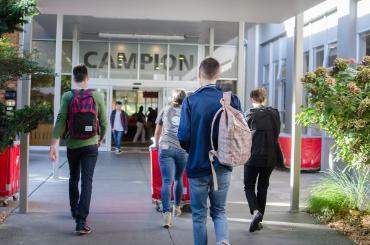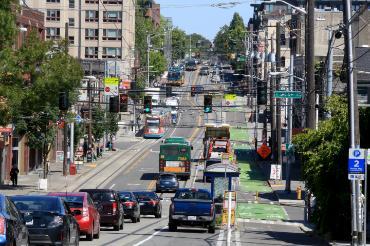Campus Safety
At the Department of Public Safety, we recognize the unique experience of attending school in the heart of an urban environment. We aim to create the safest environment possible for all community members and visitors on our 50-acre campus.
/0x27:2400x1558/prod01/channel_34/media/seattle-university/public-safety/images/SpringOnCampus2013_cjt_024.JPG)
Living on Campus

Seattle University is home to over 2,000 students living in 7 on-campus residences. As a department, we are committed to aiding all on-campus residents in feeling safe in their residences. Along with our full-time officers who are available 24-hours a day, 7 days a week, we employ student officers who assist and support the safety of residence halls during night time hours. We offer many services, such as walking safety escorts, to help students feel safe on campus at all times of the day and night.
Living in Capitol Hill

Seattle University is an open and accessible campus situated in the First Hill and Capitol Hill neighborhoods of Seattle. Living in such a vibrant community presents a very unique experience in the heart of the city. We understand that visitors enjoy our campus every day and it is our goal that everyone visiting our campus is following all university policies and procedures to foster a safe and welcoming environment for all.
Safety Tips
PERSONAL SAFETY
You are your best personal safety tool, always be alert and aware of your surroundings.
If You Sense Potential Danger
Assess the situation, then take action. Get as far away from the potential threat as you safely can. Try to join any group of people nearby or cross the street and increase your pace. If it is dark out, get to a well-lit area and contact police immediately. If there are people nearby, alert them to the potential threat. If you see someone else in trouble, call the police immediately. Provide the police with as much information as possible, including suspect description, location, vehicle information (if any) and last known direction of travel.
Call the Department of Public Safety emergency line at (206) 296-5911 with a brief explanation of the incident and your location and officers will respond immediately.
If You Are Victimized
Although your safety is maximized when you follow security precautions, you may still be the victim of a crime. Your reaction can affect whether or not you are physically harmed, so you should prepare for how you might react under a variety of circumstances. If you think your life is in immediate danger, use any defense you can think of (screaming, kicking, and running).
If you are facing an armed criminal, the risk of injury may be minimized by cooperating with their demands. In a violent crime, it is generally ineffective for the victim to cry or plead with the attacker. Such actions tend to reinforce the attacker's feeling of power over the victim. Avoid sudden movements and give the criminal what they want.
Other types of resistance, however, have often been successful; you need to decide in advance what actions you are prepared to take. Self-defense training is one method by which you can learn avoidance
strategies and resistance techniques. Contact us at (206) 296-5990 to inquire further about self-defense training.
Bias and Hate Crime Incidents
A hate crime is defined as a crime, typically one involving violence that is motivated by prejudice on the basis of ethnicity, religion, sexual orientation, or similar grounds. Even if a perpetrator is incorrect about a person’s actual identity, if they commit acts against a person based on their perception, these acts may still be considered a hate crime.
If you have been the victim of a hate crime please contact Public Safety by calling (206) 296-5911. Tell the officer the exact wording, or as much as you can remember, of what the perpetrator said to you, regardless of how offensive it is.
Sexual Assault
Seattle University and the Department of Public Safety are committed to investigating any report of sexual assault using trauma informed response and a purpose to support and care for our community. Remember, no one has the right to force or pressure another to have sex, regardless of past consent, sexual history, dress, or circumstances.
Don’t hesitate or be embarrassed to ask a friend or Public Safety officer to escort you. If you are asked to escort another person, please do so with courtesy and consideration. Helping to keep the campus safe is everyone's responsibility.
Report the activity to Public Safety and your local police. For more information on Title IX, please visit the Office of Institutional Equity (link)
For more information, you can contact:
- Seattle University Department of Public Safety: (206) 296-5990
- Seattle University Counseling and Psychological Services: (206) 296-6090
- Harborview Medical Center (206) 774-3000
- King County Sexual Assault Resource Center: (888) 998-6423
We're here to help
Officer coverage 24/7
1313 E. Columbia Building
Business office: Mon-Thurs, 8:30am-4:00pm